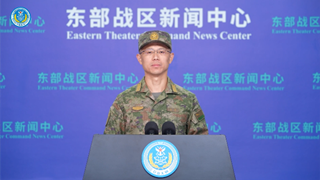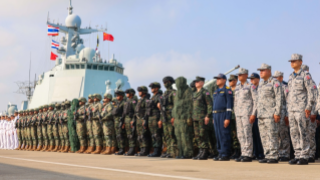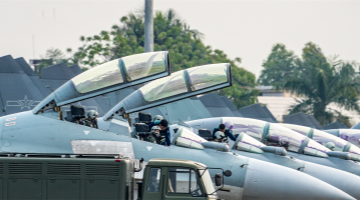By Li Meng, Cai Shuya and Yan Yujing
At the plenary session of the 21st Shangri-La Dialogue on the morning of June 2, Chinese Defense Minister Dong Jun delivered a speech on China's approach to global security. He emphasized Chinese President Xi Jinping's proposal to build a global community with shared future, along with the Global Development Initiative, the Global Security Initiative and the Global Civilization Initiative. Dong also highlighted the longstanding pursuit of harmony and peace by peoples of the Asia-Pacific region, their commitment to independence, and their recognition of the shared journey ahead.
Dong emphasized the importance of drawing upon Asian wisdom to cultivate consensus and seek common ground while reserving differences. He affirmed China's readiness to collaborate with all parties in safeguarding the legitimate security interests of every country, thereby collectively establishing a just and reasonable international order. China is committed to maximizing the role of regional security frameworks, promoting transparent and pragmatic defense cooperation, exemplifying maritime security collaboration, and reinforcing security governance in emerging domains, all of which injects fresh vigor into regional security partnerships. The progress in development and stability achieved in the Asia-Pacific region are hard-won accomplishments, reflecting the collective wisdom and efforts of its people, thus deserving even greater cherishment.
Analysts observe that China has showcased its determination and confidence to collaborate with the international community in upholding shared security and fostering peace and prosperity. China's approach to global security aligns with the fundamental interests and security aspirations of most countries. China has consistently advocated for equal treatment, trust, and respect for all countries, regardless of their size, strength, and wealth. Amidst the profound shifts in the global security landscape, China, as a constructive force for global peace and development, actively contributes its wisdom and proposals, which are of considerable importance for the security and development of the Asia-Pacific region and beyond.
Indonesia's President-elect, Prabowo Subianto, highlighted at the dialogue the crucial importance of cultivating amicable relations among neighboring nations for achieving genuine security. He underscored that cooperation is the only path to prosperity and harmony.
Political scholar Lee Pei May from the International Islamic University Malaysia noted that as the world enters a new era of global turbulence and transformation, there is a growing anticipation within the international community for more Chinese initiatives and proposals regarding global peace and security.
Notably, at this year's dialogue, the US again promoted its so-called Indo-Pacific Strategy, preaching "small circles" and clinging to a hegemonic mindset and power politics. However, this clashes with the aspirations of Asia-Pacific countries for peace and development, receiving minimal response from participants. Analysts highlight that the US pursues individual absolute security, which often leads to confrontation and division, ultimately undermining the security of all parties involved.
Koh King Kee, president of the Centre for New Inclusive Asia of Malaysia, stated that China's approach to global security pursues common peace and prosperity, rather than serving the geopolitical interests of some certain countries. Faced with the US's attempt to establish an "Asian version of NATO', ASEAN countries, unwilling to revert to the Cold War era, will not genuinely cooperate with the US' maneuvers. He explained that ASEAN countries fully recognize that the peace and stability of the past few decades have been the key to making the Asia-Pacific region the world's most active and vibrant area in economic development.









